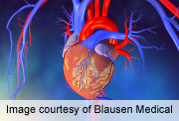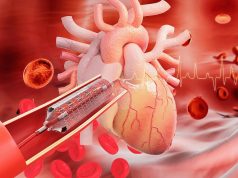Multiple 81 mg ASA more effective for suppressing serum TBX2 formation, platelet aggregation
FRIDAY, Jan. 16, 2015 (HealthDay News) — For patients undergoing coronary artery bypass graft (CABG) surgery, four-times daily acetyl-salicylic acid (ASA) seems more effective than once-daily 81 mg or 325 mg ASA, according to a study published online Dec. 27 in the Journal of Thrombosis and Haemostasis.
Jeremy S. Paikin, M.D., from McMaster University in Hamilton, Canada, and colleagues conducted a randomized study involving 100 patients undergoing CABG surgery to compare the effects of ASA 81 mg once-daily, ASA 325 mg once-daily, and ASA 81 mg four-times daily. The authors compared the effect on serum thromboxane B2 (TXB2) suppression and arachidonate-induced platelet aggregation.
The researchers found that platelet counts decreased after surgery, reached a nadir on day two, then increased gradually. On the second or third postoperative day there was near complete suppression of TXB2; levels increased on subsequent days. Patients receiving ASA 81 mg once-daily had the most marked increase, while the increase was less evident with four-times daily ASA 81 mg. Median TXB2 levels were lower on postoperative day four with four-times daily ASA 81 mg versus once-daily ASA 81 mg or 325 mg. Suppression of platelet aggregation was more effective with ASA given four-times daily versus ASA 81 mg or 325 mg once-daily.
“Four-times daily ASA is more effective than ASA 81 mg and 325 mg once-daily at suppressing serum TXB2 formation and platelet aggregation immediately following CABG surgery,” the authors write.
Several authors disclosed financial ties to the pharmaceutical industry.
Copyright © 2015 HealthDay. All rights reserved.








